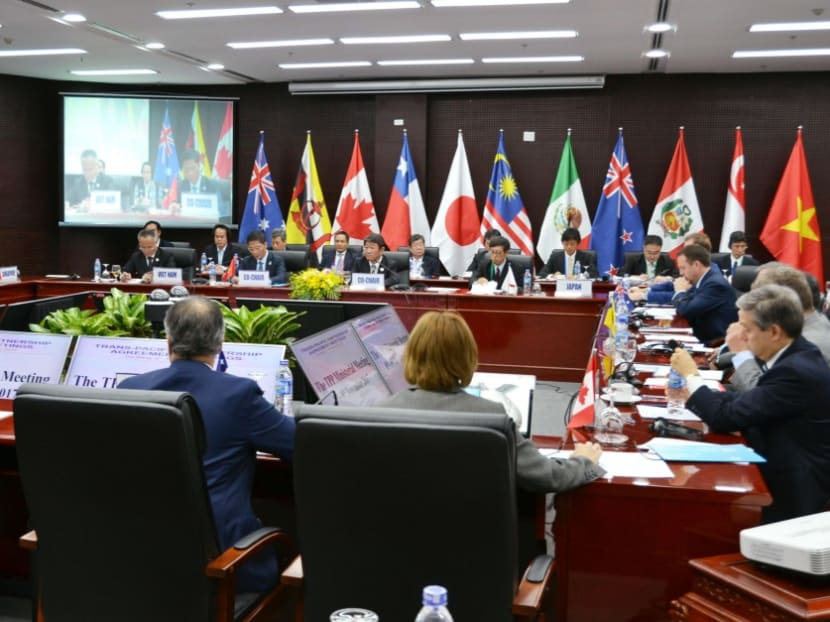11 TPP members set to sign new trade pact in March
SINGAPORE – The remaining 11 members of the Trans Pacific Partnership (TPP) have come up with a finalised agreement for a new trade pact on Tuesday (Jan 23), with the goal of signing it by early March this year.

Trade officials from the 11 countries have been meeting in Tokyo to try to resolve rifts. Photo: Reuters
SINGAPORE – The remaining 11 signatories of the Trans Pacific Partnership (TPP) finalised a new trade pact on Tuesday (Jan 23), with the goal of signing it by early March this year.
Over the past two days, senior government officials from Singapore, Australia, Brunei Darussalam, Canada, Chile, Japan, Malaysia, Mexico, New Zealand, Peru and Vietnam met in Tokyo to agree on the terms of the Comprehensive and Progressive Agreement for Trans-Pacific Partnership (CPTPP).
The CPTPP was kick-started following the withdrawal of the United States from the TPP, a decision made last January by United States President Donald Trump shortly after he was sworn in.
During this week's meeting in Tokyo, the remaining members of the TPP had resolved all outstanding issues relating to the new pact, which include finalising the list of suspended provisions, and completing the legal verification of the agreement.
Under the CPTPP, companies from the various countries will be given access to a market of 500 million people, with a combined GDP of US$10 trillion (SS$13.6 trillion).
In a statement on Tuesday, Singapore’s Ministry of Trade and Industry (MTI) said that the outcome of the CPTPP reaffirms the “countries’ collective commitment towards greater trade liberalisation and regional integration”.
Saying that Singapore views the new agreement as the “key to unlocking the benefits of the original TPP”, MTI added that other “willing and like-minded economies” can join it in the future.
Trade and Industry (Trade) Minister Lim Hng Kiang said Singapore is “pleased by the good outcome” and added that significant efforts have been made to “uphold the spirit and substance” of the original agreement, while maintaining “its high ambition and overall balance”.
Said Mr Lim: “The CPTPP will enhance trade among countries in the Asia-Pacific, resulting in more seamless flows of goods, services, and investment regionally.
“Singapore companies will gain from the substantial elimination of tariffs and non-tariff barriers for goods, improved access for service suppliers in a wide range of sectors, greater facilitation of investments, and improved access to government procurement contracts.”
After Mr Trump pulled the Americans out of the agreement last year, Japan took a leading role in pushing for a replacement pact.
Some 20 provisions of the original agreement were suspended. Those included some related to protecting labour rights and the environment, although most were related to intellectual property - one of the main sticking points after the US withdrawal.
An agreement is a huge plus for Japanese Prime Minister Shinzo Abe's government, which has painted it as a spur to growth and reform in Japan and a symbol of commitment to free and multilateral trade at a time when Mr Trump is stressing "America First" policies.
Japan's Economy Minister Toshimitsu Motegi said that the new agreement would be an "engine to overcome protectionism" emerging in parts of the world. He also said Japan would explain the importance of the deal to Washington in hopes of persuading it to join.
Canada, which has sought protection of its cultural industries, and Vietnam, which has worried about labour protection rules, will exchange separate side letters with other members on those respective topics at the time of the signing, Mr Motegi said. The precise content of the letters will not be revealed until then, a Japanese official added.
Speaking to Singapore reporters in Sri Lanka where he is on a three-day official visit, Prime Minister Lee Hsien Loong noted that despite the agreement in Tokyo, potential sensitivities remain.
"I read the report that they’ve come to some sort of agreement in Tokyo, minus the US, but we have to see how that develops, because it’s politically sensitive for some countries," he said. WITH AGENCIES






